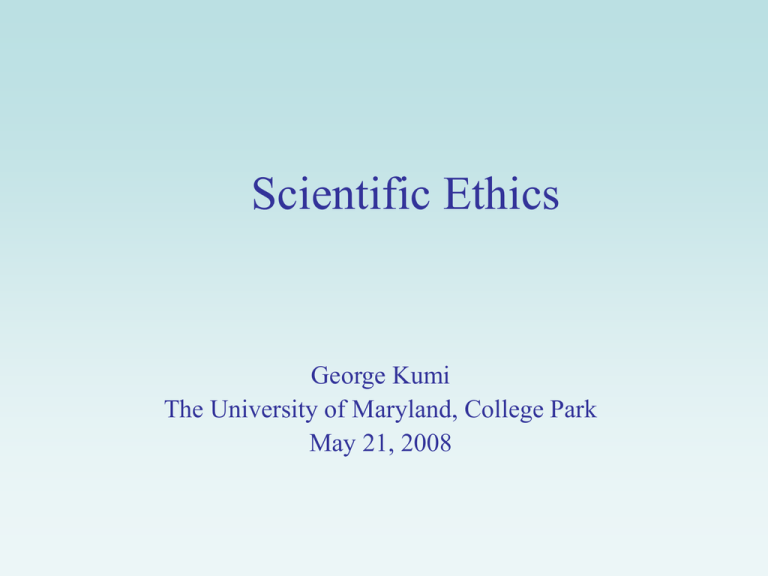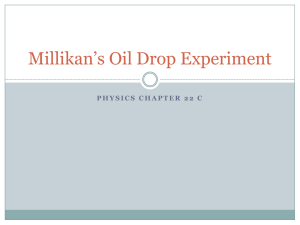ethics and science - University of Maryland
advertisement

Scientific Ethics George Kumi The University of Maryland, College Park May 21, 2008 Why have ethics in science? • What is ‘science’? Good working definition: It is the process in which we observe our universe (i.e., conduct experiments) and use these observations to expand the understanding of our surroundings • What is implied by ‘scientific ethics’? Scientific ethics generally refers to a code of conduct used in undertaking science The role of scientific ethics is to maintain public perception and trust of science Public perception: why does society value science? The role of science in society: ‘Society and its arm of action, government, understands that science has developed powerful methods for solving problems’ Sydney Brenner Science, vol. 282, p1411 (1998) How can scientists maintain or improve the public’s perception of science? • Maintain public trust (responsible research) • Inform society about the scientific process Sources of ethical guidance • How responsible research should be performed: Professional codes of conduct • How research should NOT be performed: Definition of scientific misconduct [‘fabrication, falsification, plagiarism, or other serious deviation from accepted practices in proposing, carrying out, or reporting results from activities funded by NSF’] • Mentors/supervisors, co-workers, classes, etc. Conducting responsible research: Understanding how science works and what can go wrong Scientist and the truth: “The only ethical principle which has made science possible is that the truth shall be told all the time.” C. P. Snow “The Search” “Many Scientists Admit to Misconduct” The Washington Post, June 9, 2005 15.5% Changed a study under pressure from a funding source 15.3% Dropped data from analysis based on a gut feeling 12.5% Overlooked others’ use of flawed data 10.8% Withheld details of methodology or results 6.0% Failed to present data that contradicted own previous research ETHICS AND SCIENCE As scientists, we have an ethical obligation to do "Good Science" A. How does Science work? B. How can Science go wrong? C. What are the cross-checks against error or deceit? NATURE OBSERVATIONS MODELS A. HOW SCIENCE WORKS 1. Observe the universe > experiments. 2. Inductively generalize from experiments > theory, hypothesis 3. Deductively make a prediction based on hypothesis 4. Revise hypothesis > law, paradigm HOW CAN SCIENCE GO WRONG? • • • • • Is the sampling representative? Are there unverified assumptions? Were the right questions asked? Are there systematic/subjective errors? Are the results reproducible? CASE STUDY #1 The Millikan Oil Drop Experiment Robert A. Millikan (1868-1953) CASE STUDY #1 The Millikan Oil Drop Experiment 1909-1913 Robert A. Millikan 1923 Nobel Prize + + + + + + + + + + + + ++ qE _ mg _______________ qE = weight – buoyant force = 4/3 r3 g ( oil - air) r obtained from field-free fall-time (Stokes’ Law): 4/3 r3 g ( oil - air) = 6 r v CASE STUDY #1 The Millikan Oil Drop Experiment 1978 G. Holton (Harvard): Millikan used only the data that supported his assumption of integral charge on electron, but wrote that he published all data. 1974 A. Franklin: Omitted drops were not bad, just not as precise. 2001 D. Goodstein (CalTech): Defended Millikan as “using his scientific intuition;” followed standards of his time Did Millikan go wrong? • Is the sampling representative? • • • • • Are there unverified assumptions? Were the right questions asked? Are there systematic/subjective errors? Is it reproducible? Are there alternative explanations? What could/should Millikan have done? C. WHAT ARE THE CROSS-CHECKS AGAINST ERROR OR DECEIT? (1) Peer review = review before work is done ->proposal (2) Referee system = review before work is published ->paper (3) Replication = test of repeatability after work is published REPLICATION Why is replication hard? A. Recipe incomplete B. Resources unavailable Research costs money! C. Motivation lacking No credit for second experiment Not interesting enough D. Original data lacking Conducting responsible research: Tackling ethical issues in science ETHICS PROBLEMS There is no unique solution! • Consider several solutions at same time. • Collect more information as we go. • Think creatively. Sources of ethical guidance • How responsible research should be performed: Professional codes of conduct • How research should NOT be performed: Definition of scientific misconduct • Mentors/supervisors, co-workers, classes, etc. CASE STUDY #2 “Deborah, a third-year graduate student, and Kathleen, a postdoc, have made a series of measurements at a new field site on the effect of deforestation on a oxygen levels in a stream. When they get back to their own laboratory and examine the data, they get the following plot. A newly proposed theory predicts results indicated by the curve. During the measurements at the national laboratory, Deborah and Kathleen observed that there were instrument fluctuations they could not control or predict. Furthermore, they discussed their work with another group doing similar experiments, and they knew that the other group had gotten results confirming the theoretical prediction and was writing a manuscript describing their results. In writing up their own results for publication, Kathleen suggests dropping the two anomalous data points near the abscissa (the solid squares) from the published graph and from a statistical analysis. She proposes that the existence of the data points be mentioned in the paper as possibly due to instrument fluctuations and being outside the expected standard deviation calculated from the remaining data points. "These two runs," she argues to Deborah, "were obviously wrong.“ 1. How should the data from the two suspected runs be handled? 2. Should the data be included in tests of statistical significance and why? 3. What other sources of information, can Deborah and Kathleen use to help decide?” [On Being a Scientist, NAS, http://www.nap.edu/html/obas/] ETHICS PROBLEMS There is no unique solution! • Consider several solutions at same time. • Collect more information as we go. • Think creatively. Conducting responsible research: Dealing with other scientists II. THE SCIENTIST AND "JUSTICE" DEALING WITH OTHER SCIENTISTS We have ethical obligations • to be just to our fellow scientists in recognizing their contributions Predecessors Referees/reviewers Coworkers/coauthors • to be just in allowing access to the enterprise of science Under-represented groups • to develop the "sacred possibilities" of our students Mentees Some ethical questions that arise in science: • If you see someone committing research misconduct are you obligated as a scientist to act? • Would you report a coworker? A supervisor? • Is good record keeping one of the ethical responsibilities of a scientist? • Is it unethical for a scientist not to keep abreast of a. the code of ethics in his/her field? b. the advances in his/her field? • Are all coauthors of a scientific paper equally to blame for any fabricated data in the paper? adapted from F. Macrina, Scientific Integrity






